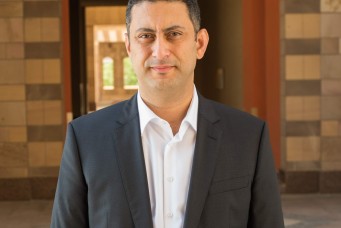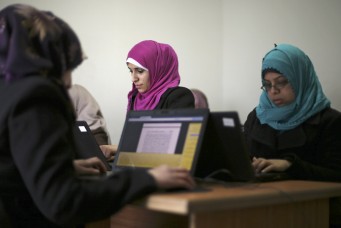The AI Guru
How Affectiva CEO and cofounder Rana el Kaliouby harnesses the power of artificial intelligence to create social change

Rana el Kaliouby using Affectiva’s Emotion AI to analyze her facial expression. Waltham, Massachusetts, 2015. Josh Andrus
The idea of artificially produced knowledge is both intriguing and intimidating: from Benedict Cumberbatch’s portrayal of Alan Turing, a British trailblazer in artificial intelligence (AI), in the 2014 hit film The Imitation Game, to Amazon’s popular virtual assistant, Alexa, AI has captured the world’s attention and materialized in our daily lives. Affectiva CEO and cofounder Rana el Kaliouby has played a crucial role in advancing artificial intelligence technology, and risen up to become a powerhouse in the world of tech.
Occupying a rare spot in the 5 percent of leadership positions held by women in the tech industry, el Kaliouby is one of the fewer still to have become a pioneer in the field of affective computing. As CEO of her company since 2016 and a chief technology officer before that, el Kaliouby launched her start-up in 2009 while envisioning “a world where technology can understand all things human,” she told the Cairo Review in an interview. Guided by this mantra, el Kaliouby went on to define a category of artificial intelligence called “Emotion AI,” and to apply its ideas, has been developing a software that can detect not only nuanced human emotions but also complex cognitive states. El Kaliouby has been recognized in Fortune’s “40 Under 40” list and Forbes America’s “Top 50 Women in Tech.”
El Kaliouby credits a liberal arts education at the American University in Cairo with broadening her perspective outside of computer science—her area of study. According to el Kaliouby, “With AI, there are many implications outside of technology—economics, psychology, and the like—that I’ve gained a useful perspective on through my education at AUC.” At 40, she now sits on the university’s Board of Trustees as its youngest-ever member.
El Kaliouby would find her fascination with AI’s ability to improve human interaction later, upon reading Rosalind Picard’s Affective Computing. She would go on to meet the author as a Cambridge doctoral student and then be invited to join her MIT lab as a postdoc. Later, she would become business partners with her own role model, and as a team, make many breakthroughs in the field while specifically addressing human and societal development. El Kaliouby firmly believes in aiding the human experience and in her search for ways to apply her technology, she is on the lookout for “partnerships and cases that have a positive impact on people’s lives, which will always be something we’re passionate about giving back to with our technology.”
Her passion for utilizing AI as an agent for social change informed her project that has driven, for example, Affectiva’s collaborative work to design smart glasses that empower those with autism to teach themselves social, emotional, and cognitive skills. Furthermore, in the field of mental health, el Kaliouby, her team, and partners plan to create discrete indicators for health conditions often stigmatized, at least in part, because of the difficulty involved in measuring them. She believes that with the help of her Emotion AI technology, healthcare providers could objectively measure patients’ mental health indicators.
One of the markets which Affectiva has successfully broken into is the automotive industry, for which the company has been developing a conversational automotive assistant. Comparable to an in-car Alexa, this assistant will be able to understand and respond to riders’ emotions and assist in situations where their judgment may be impaired. In Egypt, which alone loses around 12,000 lives per year to road traffic crashes and accidents, according to the World Health Organization, this may be quite useful. A lot of accidents are caused by drowsy or distracted driving, el Kaliouby noted, so the hope is that with advanced driver state monitoring, and appropriate vehicle alerts and adaptations, safety can be improved.
Presenting these developments through a fully female-founded company has posed unique challenges and offered compelling insight. El Kaliouby recalls meetings with male investors as spaces in which she has had to prove her own worth. Female-founded companies received just 2.2 percent of all venture capital funding in 2017. Given this, el Kaliouby firmly emphasizes the importance of diversity in the tech field. She explained that “humans tend to solve problems that we know, so if we only consider our own realities, we’ll continue to put others at a disadvantage. That’s why it’s so important for women and other minority groups to have a seat at the table and share their diversity of perspectives.”
Within Egypt, Affectiva’s Cairo office has been making important contributions to the company’s work in areas of data collection and annotation. The American Chamber of Commerce in Egypt published an article in May 2018 emphasizing Egypt’s potential as an AI hub, given how much data its population size could generate. Affectiva’s technology for its Automative AI program, for example, includes a robust dataset that is collected from drivers in Cairo specifically.
El Kaliouby hopes to see developments in both business policy and educational programs that appropriately address the challenges of breaking into AI from the region. She believes in investing in talent, and that cannot be done without developing machine-learning education programs to teach those with a penchant for learning how to build and develop AI programs. As she says, “This will give them the skills necessary to create the AI-based technologies that can really have a significant impact on the region.”
Alexandra Hall is a reporter-researcher at the Cairo Review of Global Affairs.
Read MoreSubscribe to Our Newsletter





